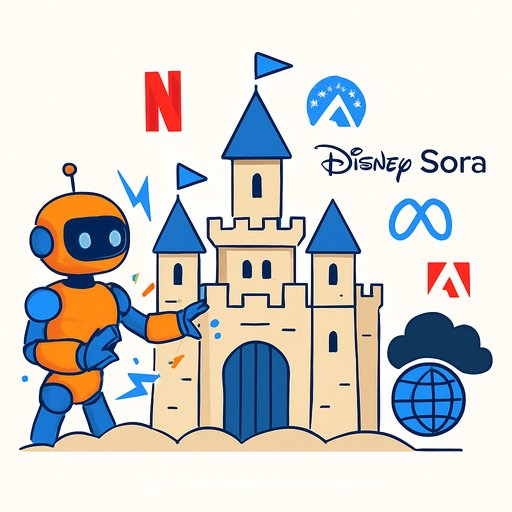Reimagining Creative Studios: EngineLab CEO Sam Reid on Cloud, AI, and Virtualised ClearView Flex
EngineLab launched in early 2023 as a premium consultancy focused on cloud-based solutions for creative studios. Its leadership team has deep roots in building cloud-native studios, shaping how creative technology functions today.
Sam Reid, EngineLab’s CEO, was previously CTO at Untold Studios. There, he built infrastructure supporting over 500 creatives across London, Los Angeles, and Mumbai. Now, he steers EngineLab’s growth with a focus on maximizing creative impact through technology.
EngineLab’s CTO Matt Herman led Psyop's move to a fully cloud-based workflow and co-founded Trace VFX, which grew to over 1,200 artists before acquisition. Daniel Goller, CRO and co-founder, drives AI innovation and R&D, having worked on infrastructure efficiency and AI integration at Untold.
As premium postproduction moves away from on-premise hardware to data center-based computing, EngineLab acts as the bridge between cloud providers and creative teams.
Starting EngineLab: Filling a Market Gap
What sparked the idea for EngineLab?
Sam Reid explains that after eight years building cloud technology and studios at Untold, he saw an opportunity to help smaller or new studios adopt modern workflows. The industry was facing pressure from Covid, strikes, and production slowdowns, causing larger studios to downsize or close. Many creatives were branching out independently.
EngineLab offers these emerging studios access to next-generation technology without heavy upfront hardware costs. Instead of investing in expensive equipment, studios can rent the compute power and infrastructure they need, paying only when they work.
What EngineLab Brings to Creative Studios
What technology solutions does EngineLab provide?
EngineLab builds everything a traditional studio requires: high-powered workstations with quality graphics cards, ample RAM and CPUs, central storage for shared files, and compute clusters for heavy simulations like water or landslides.
All components are connected securely and synchronized. The key difference is that studios don’t buy hardware—they rent it. This operational expense (opex) model replaces capital expenditure (capex), allowing studios to scale up or down depending on workload.
This approach speeds up workflows and increases creative output by enabling more iterations. Faster machines and streamlined processes mean studios can experiment more and deliver better results.
The Arc Creative Case: A Real-World Example
How did EngineLab support Arc Creative?
Arc Creative emerged quickly after Technicolor Creative Studios shut down its offices in early 2023. About 100 artists and leadership formed a new multi-studio VFX house, needing to build a studio fast to continue ongoing projects.
EngineLab stepped in to provide the technology infrastructure rapidly. Arc’s artists required powerful workstations for finishing workflows using Flame software. Thanks to EngineLab’s cloud-based model, machines and connectivity were provisioned in days rather than weeks or months it would have taken to buy and install hardware traditionally.
Integrating Virtualised ClearView Flex
Where does Sohonet’s ClearView Flex fit in virtual studios?
ClearView Flex (VFlex) is a virtualised review platform that solves a major challenge: streaming high-quality video from the cloud. Traditionally, studios relied on physical cables for video output. Sohonet has virtualised this process, enabling video to be sent efficiently over IP networks.
EngineLab deploys VFlex on AWS, providing the performance needed for demanding postproduction workflows. This allows studios like Arc Creative to view work-in-progress remotely with stable, high-quality streams. The plug-and-play nature of ClearView Flex means it can be set up quickly and reliably—a must for studios working on tight deadlines.
Ongoing Support and Scalability
Does EngineLab stay involved after studio setup?
Yes. EngineLab offers CTO-as-a-service and custom software development, delivering ongoing technical leadership. They maintain cloud infrastructure to minimize downtime, which is critical since idle artists mean lost productivity and increased costs.
By managing technology centrally, EngineLab can operate more efficiently and cost-effectively than studios hiring full in-house tech teams. As their client base grows, economies of scale will help reduce costs further.
Looking Ahead: AI and Beyond
What’s next for EngineLab?
Cloud infrastructure will remain a core focus, but AI is becoming equally important. EngineLab plans to develop custom AI tools integrated into creative pipelines. These tools will automate repetitive tasks, improve workflows, and open new creative possibilities.
From prototypes to full production, EngineLab aims to help studios adopt AI innovations that increase efficiency and creative output.
Creative professionals interested in AI’s role in media production might explore AI courses tailored to creatives to stay ahead of these developments.
Your membership also unlocks:






